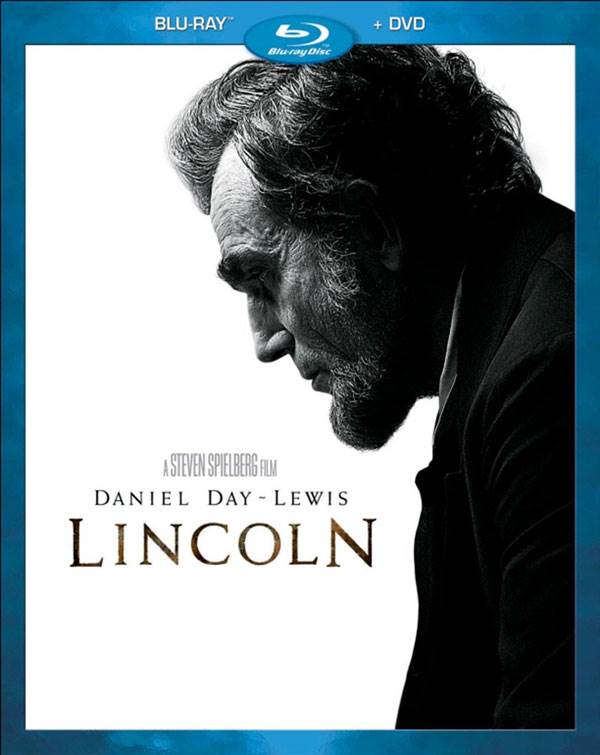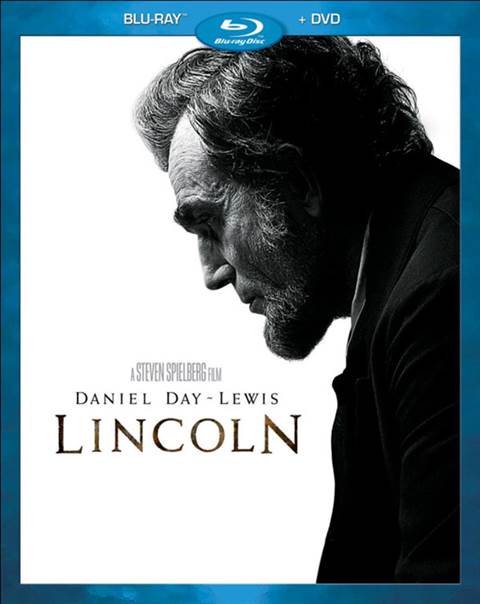Whenever Steven Spielberg has stood trial for a crime against cinema, it's been a crime of passion. With the exception of Jaws and Raiders of the Lost Ark -- each a perfect movie, if such a thing exists -- Spielberg's vice has long been his love of the tale, the art and the craft. He plucks heartstrings once too often. He extends an otherwise tight experience one scene too many or, now and again, reduces an entire third act to a tangent. He sometimes suddenly and without provocation indulges in excessive melodrama or theatrics or indulges altogether to rare yet disastrous ends.
Unlike Spielberg's fundamentally flawed films or lesser efforts, Lincoln finds the filmmaker indulging in something unexpected and most refreshing: restraint. And not just any restraint. Bold, divisive restraint. He doesn't attempt to paint broad strokes of Lincoln's presidency, focusing instead on the last four months of the 16th President's life. He doesn't cover Lincoln's many achievements, selecting one and one alone. He doesn't embed the film in the mire of the Civil War, shy from the complexities of the political era, or over-embellish the war of politics Lincoln led from the White House after his re-election in 1864. Spielberg doesn't play by the Biopic Rules at all, fashioning a riveting political drama that actively engages hearts and minds with Lincoln's shrewdest tactics, most steadfast principles, most resolute maneuverings, and his noblest pursuit.
January, 1865. The Civil War has taken a tremendous toll on the South and the Confederacy is struggling to survive. Victory is all but assured for the North. The only holdout? Surprisingly, President Abraham Lincoln (Daniel Day-Lewis), who refuses to press the advantage, even going so far as to actively delay peace talks. Fearing it would be his Emancipation Proclamation of 1863 that would be abolished at war's end, rather than slavery, he stood firm, demanding the 13th Amendment to the U.S. Constitution -- outlawing slavery and involuntary servitude -- be passed by the House of Representatives by February. To do so, though, Lincoln and Secretary of State William H. Seward (David Strathairn) have to convince a handful of lame-duck Democrats to side with the Radical Republicans and help push the Amendment through. No small feat considering the climate of the House and the forces of will come to bear on the debate, above all vitriolic Democrat Fernando Wood (Lee Pace) and Republican Thaddeus Stevens (Tommy Lee Jones), an abolitionist ideologue whose goals are even loftier than Lincoln's. What follows is a tense race to secure enough votes to pass the first Constitutional Amendment in more than sixty years, a fascinating foray into the history of American politics, and a compelling character drama.
There comes a moment midway through Lincoln in which Spielberg, Oscar-nominated screenwriter Tony Kushner, and award-winning method chameleon Daniel Day-Lewis offer an unfiltered glimpse into the inner workings of Abraham Lincoln's mind. It only happens once, and only lasts a few short minutes. But in those minutes we see Lincoln a decent and honorable man, unwilling to waver in his moral convictions, whatever the cost. The master tactician is willing to commit lesser political sins for the greater common good. The discerning Springfield lawyer, divining lawful from unlawful. The cunning politician, navigating the endless labyrinth of legalities, sanctions, and allowances before him. The eloquent orator, rich in speech and sharp in tongue. The President of "these United States," with full authority and a frightening command of his faculties; a contrast to his aging body, declining posture, and careful steps. It's a breathtaking scene, unapologetically minimalistic in its presentation -- a camera transfixed by Lincoln's weary face -- yet nearly inexhaustible in both its implication and revelation, it goes a little something like this:
"I decided that the Constitution gives me war powers, but no one knows just exactly what those powers are. Some say they don't exist. I don't know. I decided I needed them to exist to uphold my oath to protect the Constitution, which I decided meant that I could take the rebel slaves from them as property confiscated in war. That might recommend to a suspicion that I agree with the rebs that their slaves are property in the first place. Of course, I don't. Never have. I'm glad to see any man free, and if calling a man property, or war contraband, does the trick... why I caught at the opportunity.
"Now here's where it gets truly slippery. I use the law allowing for the seizure of property in a war knowing it applies only to the property of governments and citizens of belligerent nations. But the South ain't a nation, that's why I can't negotiate with them. If in fact, the Negroes are property according to law, have I the right to take the rebels' property from them, if I insist they're rebels only and not citizens of a belligerent country? And slipperier still: I maintain it ain't our actual Southern states in rebellion but only the rebels living in those states, the laws of which states remain in force. That means, that since it's the states' laws that determine whether Negroes can be sold as slaves, as property, the Federal government doesn't have a say in that. At least not yet when Negroes in those states are slaves, hence property, hence my war powers allow me to confiscate them as such. So I confiscated them. But if I'm a respecter of states' laws, how then can I legally free them with my Proclamation, as I done, unless I'm canceling states' laws? I felt the war demanded it. My oath demanded it. I felt right with myself, and I hoped it was legal to do it. I'm hoping still. Two years ago I proclaimed these people emancipated. "Then, henceforward and forever free."
"But let's say the courts decide I had no authority to do it. They might well decide that. Say there's no amendment abolishing slavery. Say it's after the war and I can no longer use my war powers to just ignore the courts' decisions, like I sometimes felt I had to do. Might those people I freed be ordered back into slavery? That's why I'd like to get the Thirteenth Amendment through the House, and on its way to state ratification. Wrap the whole slavery thing up, forever, and aye as soon as I'm able. Now. End of this month. And I'd like you to stand behind me. Like my cabinet's most always done."
There are dozens of similar unorthodox dramatic beats -- some moving, some cerebral, some heartbreaking, some volatile -- but each one is just as hypnotic, if not more so. Daniel Day-Lewis' performance has been hailed as one of the greatest of his generation and awarded numerous honors including a much-deserved Academy Award. Day-Lewis doesn't merely inhabit Lincoln's frame and figure, he all but summons the former President to Spielberg's stunningly realized historic stage, drawing from every available account of Lincoln's poise, presence, and personality to forge a fully realized incarnation almost indistinguishable and henceforth inseparable from the man himself. And while much has been made of the actor's extreme method and utter commitment to the role, the results defy hyperbole and even what relatively little criticism has been leveled against the film. To wit: it isn't just one of the finest performances of 2012, it's one of the finest performances you'll likely ever see.
The lion's share of the credit can't simply be hoisted upon Day-Lewis' shoulders, though. Spielberg's command of the film rivals Day-Lewis' command of the screen, Kushner's screenplay and dialogue crackles with uncompromising authenticity and reasonable creative freedom, the cinematography is both gorgeous and wonderfully suited to the tone and tenor of the film, Rick Carter's production design and Joanna Johnston's costumes are wholly convincing... you get the idea. Day-Lewis steals almost every scene, but any given scene is only his for the taking because of the enormously talented team working tirelessly at Spielberg's side. Surrounding Day-Lewis' Lincoln is also a smartly assembled supporting cast of memorable veterans and colorful character actors. Sally Field, Tommy Lee Jones, Gloria Reuben, and David Strathairn are terrific; Field especially, whose impassioned, sometimes embittered portrayal of a somewhat questionably astute Mary Todd Lincoln challenges Day-Lewis as fiercely as Lincoln's wife challenges the President. The majority of the remaining cast delivers as well, often one after another (Lee Pace, Hal Holbrook, Jackie Earle Haley, John Hawkes, Jared Harris, Walton Goggins, Stephen Henderson little Gulliver McGrath, to name just a few).
Lincoln is an absorbing account of four months of the 16th President's life, powerful political theater, and an engrossing period piece. Lincoln remains one of the most acclaimed and celebrated films of 2012, and deservedly so.
Lincoln boasts a top-tier 1080p/AVC-encoded video transfer, true to the intimate cinematography and director Steven Spielberg's beautifully evocative intentions.
Like its video transfer, Lincoln's DTS-HD Master Audio 7.1 surround track values subtlety above all else, presenting the film's original sound design without fault and replicating its exceedingly immersive sound field without fail.
Lincoln is available via Blu-ray: a 4-disc BD/DVD Combo with a single Blu-ray disc, standard DVD, digital copy, and a disc for extras, which include:
The Journey to Lincoln: Director/producer Steven Spielberg, fellow producer Kathleen Kennedy, screenwriter Tony Kushner, actor Daniel Day-Lewis, production designer Rick Carter, "Team of Rivals" author Doris Kearns Goodwin, and other collaborators essentially introduce the film in this short featurette, discussing the genesis of the project, the focus on a small but crucial period of Lincoln's life, the screenplay and production, and more.
A Historic Tapestry: Richmond, Virginia: The first disc's second (and final) featurette is also surprisingly short -- much shorter, actually -- affording Spielberg, Kennedy, and Carter little time to elaborate on the decision to set and shoot the film in Richmond, much less the strides made, the challenges faced or the legacy evoked.
In the Company of Character: Key members of the cast and crew dissect Lincoln's chief performances, from extreme method actor Daniel Day-Lewis' process and complete devotion to the role to Sally Field's enthusiasm and commitment, Gloria Reuben's thoughtful contributions, Tommy Lee Jones' gruff gravitas, Joseph Gordon-Levitt's contributions, James Spader's flair, Hal Holbrook's and David Strathairn's approach, just to touch on a few. (This is exactly what happens in a ten-minute featurette about the complex work of more than a dozen chameleon actors.)
Crafting the Past: A Deeper Look at Rick Carter's Production Design and Joanna Johnston's Costumes, as well as the detail and authenticity of the sets, props, clothing, and transformed locales. Not only did history, research, written accounts, letters, and centuries-old photographs inform the look of the film, but the set decoration's personal touches emerged as a non-traditional supporting performance in their own right.
Living with Lincoln: The most engrossing special feature is also the 2-disc set's most substantive and satisfying, covering the method to Spielberg and his team's full-immersion madness, creating a period biopic as true to history as possible, the ongoing evolution of the shoot and just about every expected and unexpected aspect of the film.
In Lincoln's Footsteps: Spielberg, Kennedy, editor Michael Kahn, composer John Williams, and others cover the film's pacing, the art of weaving a visual narrative, drawing the audience into a dialogue-drive film, forgoing complicated tricks of the trade in favor of simplicity, scoring Lincoln and other topics not covered elsewhere.
Lincoln resonates for several reasons, none perhaps more so than this: at a time of unease, uncertainty, partisan bickering, and unyielding filibustering in American politics, Spielberg and Kushner's blend of shrewd realism and principled idealism suggests all is not lost; that democracy is greater than those who would exploit its freedoms or stall its progress; that men and women of conviction will prevail, and that the will of the people and the common good will be their guide. Overly idealistic? Maybe. Still, cynicism accomplishes very little, and Lincoln stands apart from the overwhelmingly cynical political dramas that litter the market. The craft of the film and the quality of its direction, screenplay, and performances make it all that much more mesmerizing, not to mention that much more effective. It may not be perfect, but it wholeheartedly believes in something that just might be.
Grade: A







